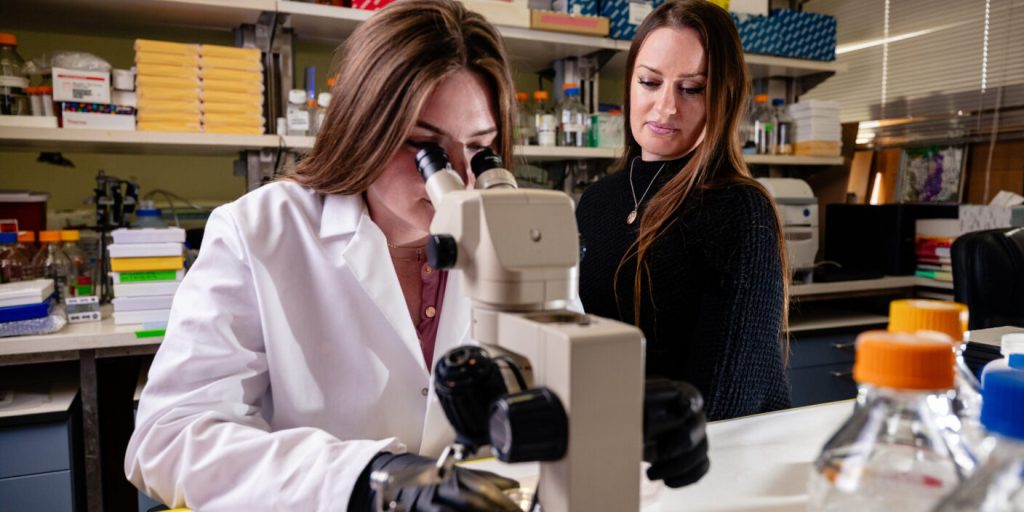HUNTSVILLE — A treatment for conditions that underlie the development of Type 2 diabetes could evolve from new basic research discoveries at the University of Alabama in Huntsville.
A team led by UAH has characterized the metabolic function of a phosphatase enzyme called mitogen-activated protein kinase phosphatase-2 as well as its disordered processes in obesity, Type 2 diabetes and nonalcoholic fatty liver disease.
“This opens many opportunities for further research towards treatment of Type 2 diabetes and other metabolic diseases,” said Dr. Ahmed Lawan, an assistant professor of biological sciences, the research paper’s lead author and the principal investigator.
“Recent work on the development of MKP-5 inhibitors has opened the door to novel strategies of allosteric modulation of MKPs that in general can be applied to MKP-2. However, more work needs to be done.”
The UAH scientists employed mice that were genetically engineered to lack MKP-2. They also used human liver tissue derived from fatty liver disease patients to investigate the physiological contribution of MKP-2.
The mice were supplied by the University of Strathclyde in the United Kingdom, and the University of Kansas provided human liver samples from obese non-alcoholic steatohepatitis patients. The University of Texas at El Paso helped design some of the experiments and edited the manuscript.
“We show, for the first time ,that MKP-2 protein expression was upregulated in liver tissue in humans with obesity and fatty liver disease, and in insulin-responsive tissues in mice with obesity,” said Lawan. “The upregulation of MKP-2 in the liver in obesity is part of a stress response that contributes to the development of insulin resistance, Type 2 diabetes and fatty liver disease.”
On the other hand, in major-insulin responsive tissues, the mice showed enhanced activities of proteins that regulate cellular processes when compared with control mice.
“MKP-2 deficient mice fed a high-fat diet are resistant to weight gain, owing to reduced food intake,” Lawan said. “Mice lacking MKP-2 were protected from development of fatty liver.”
The UAH team’s testing found that MKP-2 deficient mice showed an improved balance of blood glucose levels and better insulin sensitivity.
“Furthermore, we show that MKP-2 upregulation in obesity is consistent with reduced levels of insulin-like growth factor in mice with fatty liver disease and insulin resistance,” said Lawan. “These data indicate that upregulation of MKP-2 is a physiologically relevant response and might be beneficial in hepatic lipid utilization during obesity by antagonizing the p38, MAPK, JNK and ERK signaling module.”
The UAH investigators can’t say there’s a causal relationship between MKP-2 and Type 2 diabetes onset because their research “is just the beginning of the story on the role of MKP-2 in whole body metabolism,” Lawan said.
“The family of phosphatases are a very interesting group of enzymes that do not receive sufficient attention in the signaling field, given that they perform vital functions in terminating MAP kinase signaling,” he said. “MKP-2 is a poorly studied MKP.”
The UAH team members were Savanie Fernando, a 2021 biological sciences master’s degree graduate; Jacob Sellers, a biological sciences senior; Shauri Smith, a graduate student at the time of the research; Dr. Sarayu Bhogoju, a post-doctoral researcher now at the University of Kentucky; Sadie Junkins, a 2022 graduate with a bachelor’s degree in biological sciences who has applied to medical school; Nabin Ghimire, a biological sciences doctoral student; Cassandra Secunda, a biological sciences master’s degree student; and Morgan Welch, a biological sciences master’s degree student.
Research is continuing to fully understand the role of the MKP-2 enzyme in liver metabolism, Dr. Lawan said.
“The goal of future studies is to address the tissue-specific contribution of MKP-2 in tissues such as the liver, brain and pancreas towards glucose disposal and energy metabolism,” he said. “We will continue our efforts to evaluate the translatability of our findings in MKP-2 deficient mice using liver, adipose tissue and pancreas samples from obese NASH and Type 2 diabetes patients.”











